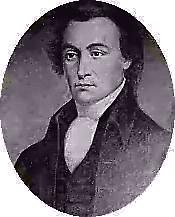Mark Cole
Dr. Matthew Thornton, born in Ireland, would live to be 89 years old. Along the way he led an incredible, active and productive life.
As a child and young man, he was educated by his father in preparation for a learned profession. Thornton chose medicine. As a talented young doctor in Londonderry, New Hampshire, his medical practice flourished. Quite naturally, then, his civic obligations increased.
Under the royal government in New Hampshire, he served as justice of the peace, and as a colonel in the militia. In 1745, he became the surgeon for some 500 troops from New Hampshire in an expedition against a French fortress in Nova Scotia. Under his superb medical care, only five of the troops died from sickness during this long and dangerous expedition.
As the 1760’s and the 1770’s approached, the political crisis between the colonies and Mother England deepened. And Dr. Thornton sided with the patriot cause – undoubtedly to the deep dismay of the Crown.
In 1775, when the loyalist Governor Wentworth abdicated, the provincial government of New Hampshire elected Dr. Matthew Thornton to the chief executive office. In that office, he reportedly gave a speech which began like this:
“Friends and brethren, you must all be sensible that the affairs of America have, at length, come to a very affecting and alarming crisis. The horrors and distresses of a civil war, which, till of late, we only had in contemplation, we now find ourselves obliged to realize. Painful beyond expression, have been those scenes of blood and devastation which the barbarous cruelty of British troops have placed before our eyes. Duty to God, to ourselves, to posterity, ends forced by the cries of slaughtered innocents, have urged us to take up arms in our own defense.
Such a day as this was never before known, either to us or to our fathers. You will give us leave, therefore, in whom you have reposed special confidence, as your representative body, to suggest a few things, which call for the serious attention of every one, who has the true interest of America at heart. We would, therefore, recommend to the colony at large, to cultivate that Christian union, harmony, and tender affection, which is the only foundation upon which our invaluable privileges can rest with any security, or our public measures be pursued with the least prospect of success.”
In 1776, Dr. Thornton served as a non-lawyer judge of the Superior Court of New Hampshire. In the fall of 1776, he represented the people of New Hampshire in Philadelphia as a member of the Continental Congress.
But by the time he arrived in Philadelphia, in November of 1776, the Declaration had already been signed, and hostilities between the colonists and the king had already erupted.
The easier course would have been for Thornton to ignore the formalities, and simply to try to quietly do his job. Why not let the other signers take most of the heat? After all, they had already drawn attention to themselves and become marked men for signing the Declaration. He arrived too late to support the Declaration, so why not just let bygones be bygones?
Such half-hearted thinking was not for Dr. Matthew Thornton. There was certainly no pressure for him to sign the Declaration. In fact, he would have to ask for special permission to sign the Declaration.
Even so, Thornton desired to stand shoulder to shoulder with the other patriots. He asked, and special permission was given. Dr. Matthew Thornton thus willingly pledged his life, fortune and sacred honor to the cause. And he did so when he truly didn’t have to.
Thornton was sixty two years old when he signed the Declaration of Independence. After the war, he continued his service as a judge on the Superior Court and retired to a farm near Exeter in 1789. He lived until 1803.
Want more awesome history on our Founders?
Check out Mark’s book:
Lives, Fortunes, Sacred Honor: The Men Who Signed the Declaration of Independence
















